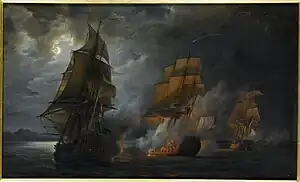 Naval battle off the coast of Lisbon, 20 October 1778. The French ship Triton against the British ship Jupiter and the frigate Medea. Painting by Pierre-Julien Gilbert | |
| History | |
|---|---|
| Name | Triton |
| Ordered | 9 November 1745 [1] |
| Builder | Toulon [1] |
| Laid down | January 1747 [1] |
| Launched | 4 August 1747 [1] |
| In service | December 1747 [1] |
| Out of service | 1794 [1] |
| Fate | Broken up 1794 |
| General characteristics [2] | |
| Tons burthen | 1240 tonne |
| Length | 48.6 metres |
| Beam | 13.2 metres |
| Draught | 6.8 metres |
| Propulsion | Sails |
| Sail plan | Full-rigged ship |
| Complement |
|
| Armament |
|
| Notes | 6-month autonomy.[3] |
Triton was a 64-gun ship of the line of the French Navy designed by François Coulomb the Younger. She took part in the Seven Years' War and in the War of American Independence.
Career
On 30 July 1757, Triton rescued the crew of the 30-gun frigate Rose, and her captain, Sade de Vaudronne, had her beached and scuttled by fire to prevent her falling into British hands after a battle with the 32-gun HMS Thames.[4]
In June 1758, under Captain du Lac de Montvert, Triton captured the frigate HMS Deal Castle.[1]Triton took part in the Battle of Lagos on 18–19 August 1759.[5]
In 1777, she was under Brach. Navy Minister Sartine chose her to be one of the six ships held ready for immediate departure at all times.[6][Note 1]
In 1778, Triton was part of the squadron under Orvilliers, being the last ship in the First Division of the Blue Squadron (Rear).[7] Her commanding officer was Captain Ligondès.[8] In the action of 20 October 1778, Triton managed to disable HMS Medea and fight of the 50-gun Jupiter.[9]
In 1779, she was part of the light squadron in Orvilliers' fleet, under La Clocheterie [10]
In 1780, she was part on Guichen's squadron, under Captain Brun de Boades.[11][12] She took part in the Battle of Martinique on 17 April 1780.[13] On 21 August 1780, Captain Deydier de Pierrefeu took command, until 2 June 1782.[14]
In 1781, she was attached to a squadron under Monteil, and took part in the Siege of Pensacola from 21 April.[1]
On 24 November 1782, Triton was at Saint-Pierre, Martinique, part of a squadron that comprised Solitaire, Résolue, Nymphe, and the brig Speedy.[15]
On 10 February 1783, Triton captured the 12-gun HMS Tickler off Cuba.[1]
Fate
After the war, Triton was put in the ordinary at Toulon. from 1783 to 1785, she was on loan to the Compagnie de Chine as a merchantman.[1] She was eventually broken up in Cherbourg in 1794.[1]
Notes
Citations
- 1 2 3 4 5 6 7 8 9 10 11 Roche (2005), p. 447.
- ↑ Roche (2005), p. 20.
- 1 2 3 Demerliac (1995), p. 44, n°258.
- ↑ Roche (2005), p. 386.
- ↑ Troude (1867a), p. 372–373.
- 1 2 Lacour-Gayet (1910), p. 91.
- ↑ Lacour-Gayet (1910), p. 617.
- ↑ Archives nationales (2011), p. 20.
- ↑ Lacour-Gayet (1910), p. 606.
- ↑ Lacour-Gayet (1910), p. 640.
- ↑ Archives nationales (2011), p. 284.
- ↑ Lacour-Gayet (1910), p. 643.
- ↑ Troude (1867b), p. 71.
- ↑ Contenson (1934), p. 243.
- ↑ Guérin (1857), p. 124.
References
- Contenson, Ludovic (1934). La Société des Cincinnati de France et la guerre d'Amérique (1778-1783). Paris: éditions Auguste Picard. OCLC 7842336.
- Demerliac, Alain (1995). La Marine de Louis XV: Nomenclature des Navires Français de 1715 à 1774 (in French). Éditions Ancre. ISBN 2-906381-19-5.
- Guérin, Léon (1857). Histoire maritime de France (in French). Vol. 5. Dufour et Mulat.
- Lacour-Gayet, Georges (1910). La marine militaire de la France sous le règne de Louis XVI. Paris: Honoré Champion.
- Roche, Jean-Michel (2005). Dictionnaire des bâtiments de la flotte de guerre française de Colbert à nos jours 1 1671 - 1870. p. 48. ISBN 978-2-9525917-0-6. OCLC 165892922.
- Troude, Onésime-Joachim (1867a). Batailles navales de la France (in French). Vol. 1. Challamel ainé.
- Troude, Onésime-Joachim (1867b). Batailles navales de la France (in French). Vol. 2. Challamel ainé.
External links
- Archives nationales (2011). "Fonds Marine, sous-série B/4: Campagnes, 1571-1785" (PDF). Retrieved 29 April 2020.